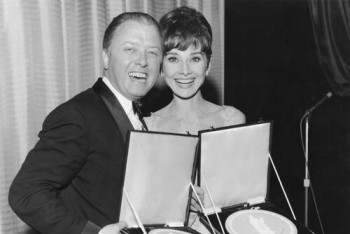 BAFTA
BAFTA An esteemed and profoundly committed filmmaker, Richard Attenborough was a tireless supporter of BAFTA's charitable and educational causes for several decades.
"Lord A", as he was affectionately called by BAFTA staff, or "Dickie" to his friends, Richard Attenborough (29 August 1923 – 24 August 2014) was integral to countless BAFTA occasions and key moments in its prestigious history, from the international scope and very British style of our early Awards ceremonies to the opening of our 195 Piccadilly headquarters in 1976 and the presentation of a Film Fellowship to co-collaborator and friend Sir Anthony Hopkins in 2008.
Behind the scenes and in his role as President between 2002 and 2010, Lord Attenbrough's contribution to the financial stability and effective leadership of BAFTA was invaluable.
Throughout his career, whenever something important happened at BAFTA, Lord Attenborough was part of it. As Amanda Berry, BAFTA's CEO from 2000 to 2022, said on the occasion of his 80th birthday, he is: "A wonderful man, a talented actor, producer and director, an inspiration to all who meet him, an icon of the British Film Industry and passionate about BAFTA."
A wonderful man, a talented actor, producer and director, an inspiration and an icon..
Biography
Lord Attenborough was born in Cambridge, England in 1923. He later attended the Royal Academy of Dramatic Art (RADA) to study theatre. He made his feature film debut in 1942 with In Which We Serve, followed shortly after by a breakthrough role as a young hood in Brighton Rock (1947). In the 1950s, Attenborough appeared in successful comedies for John and Roy Boulting.
In the late 1950s, Attenborough formed a production company, Beaver Films, with Bryan Forbes and began to produce projects including The League of Gentlemen (1959), The Angry Silence (1960) and Whistle Down the Wind (1961). Over the next ten years he expanded his range of character roles in films such as Seance on a Wet Afternoon (1964) and Guns at Batasi (1964), for which he won the BAFTA for Best Actor. In 1963, he appeared in the ensemble cast of The Great Escape. In 1967 and 1968, Attenborough won two Golden Globes as Best Supporting Actor. He would win another Globe for Best Director, for Gandhi, in 1983.
He took no acting roles after 1978, until his appearance in Spielberg's Jurassic Park (1993). The following year he starred in the remake of Miracle on 34th Street. Since then he has made appearances in supporting film roles.
His directorial debut was a screen version of the hit musical Oh! What a Lovely War (1969), and thus his acting roles became less frequent - the most notable being his portrayal of a serial killer in 10 Rillington Place (1971). Attenborough later directed two epic period films: Young Winston (1972) and A Bridge Too Far (1977). He won two BAFTAs and two Oscars in 1982 for producing and directing the historical epic, Gandhi, his life’s ambition; it remains BAFTA's most nominated film with 16, of which it won five. He received a BAFTA Fellowship in 1983.
More recent films as director and producer include Chaplin (1992) and Shadowlands (1993). Both films starred Anthony Hopkins, who appeared in another three films for Attenborough. He also directed the screen version of musical A Chorus Line (1985) and the apartheid drama Cry Freedom (1987). He was nominated for a Golden Globe for Best Director for both films. He has since directed Grey Owl (1999) and Closing The Ring (2007).
In 1967, he was made a Commander of the Order of the British Empire (CBE). He was knighted in 1976 and in 1993 made a life peer as Baron Attenborough, of Richmond upon Thames. He has received too many other Awards, honours and accolades to mention.
Attenborough died at the age of 90 on 24 August 2014. His remarkable career spanned six decades.
BAFTA Awards
Richard Attenborough received 13 BAFTA nominations and won four (excluding the UN Award). Date listed represent the year of nomination.
| 1960 | British Actor | The Angry Silence |
| 1962 | British Actor | The Dock Brief |
| 1964 | British Actor | Guns at Batasi / Séance on a Wet Afternoon |
| 1969 | Direction | Oh! What a Lovely War |
| 1969 | Film | Oh! What a Lovely War |
| 1977 | Direction | A Bridge Too Far |
| 1982 | Film | Gandhi |
| 1982 | Film | Gandhi |
| 1982 | Direction | Gandhi |
| 1982 | Direction | Gandhi |
| 1987 | Film | Cry Freedom |
| 1987 | Direction | Cry Freedom |
| 1993 | Film | Shadowlands |
| 1993 | British Film (Alexander Korda Award) | Shadowlands |
| 1993 | Direction (David Lean Award) | Shadowlands |
Key Dates
| 1959: Joined the Academy | |
| 1961: Became Council Member | |
| 1969: Appointed Chair (until 1971) | |
| 1971: Proposed the introduction of a Fellowship. The Fellowship was first presented by the Society of Film and Television Arts (SFTA) in 1971 to Alfred Hitchcock. | |
| 1972: Became Trustee (until 2003). | |
| 1973: Became Vice President (until 1995) | |
| 1983: Received the Fellowship | |
| 2000: Tribute Award for Lifetime Achievement | |
2002: Became BAFTA's fourth President
|
|
| 2003: 80th Birthday Celebration at BAFTA | |
| 2014: Lord Attenborough died on 24 August at the age of 90 |





